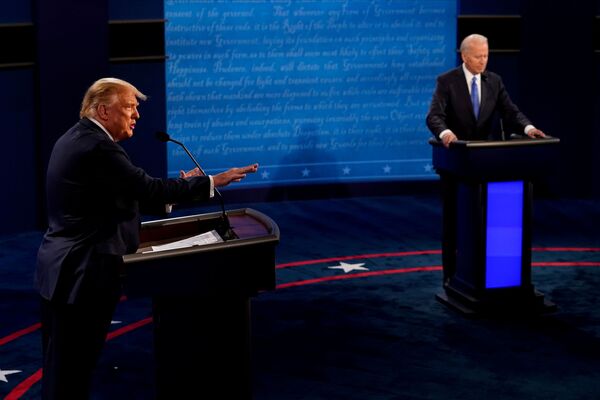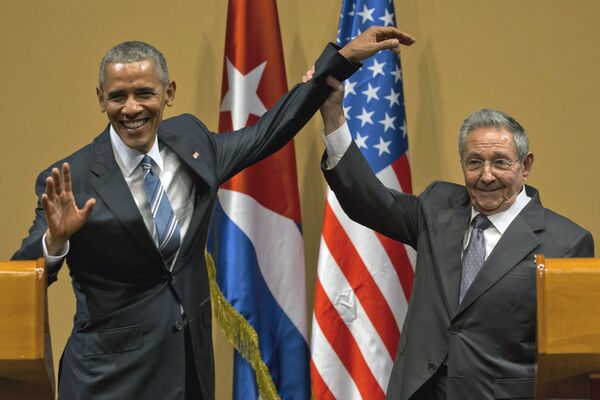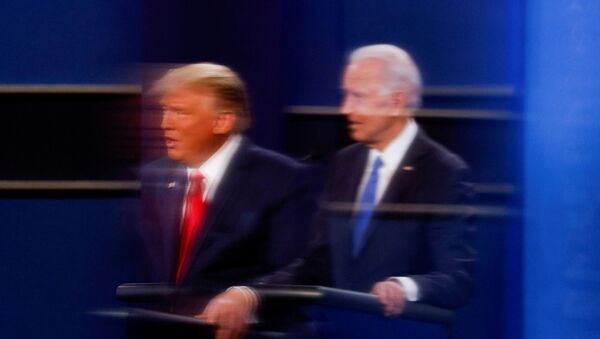Latin America's reaction to the US mainstream media's announcement of Joe Biden's win was not unanimous: while Argentina's President Alberto Fernández, his Uruguayan counterpart Luis Lacalle Pou, and Venezuela's Nicolas Maduro congratulated the Democratic nominee and praised American democracy, the leaders of Latin America's two largest countries, Mexico and Brazil, made it clear that they would not recognise the winner until the legal disputes have been resolved in the US.
'US Looks Like Quite a Mess'
Donald Trump adopted a relatively tougher stance towards Latin America than his predecessor, reversing Barack Obama's opening to Cuba, cracking down on immigration from Mexico, and supporting an attempted coup against Venezuela's President Maduro in January 2019. The Trump administration also endorsed Bolivia's de facto interim President Jeanine Anez, who governed the country for a year after the military ouster of Evo Morales in November 2019.
Now that the US is engulfed by the election controversy, Latin Americans are watching the unfolding events with mixed feelings, notes Juan Martin Gonzalez Cabañas, Argentine geopolitical analyst at Vision & Global Trends and political consultant.
"In my perception nowadays the US looks like quite a mess", Gonzalez Cabañas says. "For obvious reasons for many Latin Americans there is a sense of complacency, when observing the country that for so long wanted to be its teacher in democracy, elections and institutions, today goes through such a confusing situation".
The electoral process in the United States has never served as a model of democracy, according to Gustavo Guerreiro, executive editor of the journal World Tensions and a member of the Brazilian Centre for Solidarity with Peoples and Struggle for Peace (CEBRAPAZ).
"This is a mere formality to endorse the perpetuation of their political and economic elites in power", he believes. "Internally, US political propaganda sells them as the champions of democracy, but here in Latin America, the US was the biggest sponsor of post-war civil and military dictatorships".
What's Behind the US Electoral Debacle?
There are a number of causes which can be attributed to the current US political chaos, according to the Latin American observers.
Gonzalez Cabañas outlines four potential reasons behind the socio-political stalemate:
· internal struggle between sectors of its elite-ruling class (globalists vs nationalists);
· a polarised society in the midst of a process of change;
· the design of a rigid oligarchic socio-political-institutional system;
· a "rigged system" in Trump's words, distant from popular representation and social demands.
For his part, Guerreiro refers to longstanding issues, including US income inequality, racial and class-based divisions, lack of a public social protection system, and growing poverty, which are eroding the social fabric of the country. The coronavirus pandemic, which has claimed the lives of more than 250,000, has seemingly become the last straw, according to him.
On the top of this, the US electoral processes usually support the domination of American elites, represented mainly by the "deep state", the military, and Wall Street, which have their lobbies in the White House and on Capitol Hill, the Brazilian scholar remarks. "This distorted electoral system means that the candidate most voted by the population is not elected", he opines.

Who is More Preferable for Latin American States, Biden or Trump?
On 7 November, Foreign Policy Magazine suggested that Latin America would feel relieved if Joe Biden occupies the White House on 20 January 2021.
Indeed, this discussion has recently become viral in the Argentine press, admits Gonzalez Cabañas, warning against leaping to conclusions.
"There really is no 'preferable candidate' for Argentina, which will have to continue facing the same strategic (and therefore structural) challenges posed by its relationship with the United States", he highlights. "The major challenge [for Buenos Aires] is achieving Argentine national interest despite being located in the same immediate 'geopolitical neighbourhood' of the North American great power".
When it comes to Brazil, apparently, Biden may be a "lesser evil", although none of the American presidential candidates represents, in fact, a structural change in Washington's relations with Brazil and Latin America in general, opines Guerreiro.
"The election of Joe Biden may represent changes in foreign policy, especially with regard to the environmental issue, which is so important and dramatic for Brazil", the Brazilian scholar notes. "Perhaps the return of the US to the environmental agenda, even after withdrawing from the Paris agreement, may exert some pressure on President Bolsonaro's drive to stimulate the devastation of forests and indigenous lands".
At the same time, Biden is likely to implement less protectionist economic policies and pay due respect to bilateral agreements between Washington and Brasilia: "The Brazil-United States Chamber of Commerce itself believes that the Joe Biden government will have clearer rules and will use fewer unilateral measures, such as those applied to steel and aluminium", the scholar elaborates.
Still, one should not delude oneself into believing that Washington's policy of interference in the domestic affairs of Latin American countries will undergo any changes if Biden wins, he remarks.

How Might US-Latin America Relations Change Under Biden?
"I believe that the trend is for a mild change in relation to Latin America [if Trump steps down]", says Guerreiro.
He refers to an October New York Times article outlining Joe Biden's plans for Latin America, which are both a "repudiation of Mr Trump's hardball approach and an attempt to resurrect Obama-era initiatives".
Besides this, however, the article says that that Biden’s advisers would seek to revive the anti-corruption campaign that set off political earthquakes across the Americas starting in 2014, but that largely stalled in recent years, Guerreiro highlights, recalling that these very policies spearheaded by the US Department of Justice led to the removal of progressive leftist governments in Latin America and destroyed regional leaderships not aligned with Washington.
"Biden is a legitimate representative of the Democratic Party's right wing, and his policy towards Latin America is slightly different, having more similarities than divergences with that of the Trump administration", he suggests.
The Argentine geopolitical analyst agrees that generally relations between the United States and its Latin American neighbourhood will not change too much.
The crux of the matter is that these relations are conditioned by a number of geostrategic factors, according to Gonzalez Cabañas.
"In the geopolitical codes, Latin America is its immediate sphere of influence, and since the early 2000s while the US concentrated its major foreign action in other areas of the world, the Americas have seen the presence of other extra-regional actors consolidated in Latin and South America, especially China, which are currently seen as global strategic competitors", he notes.
Given this, the US is likely to continue its attempts to regain its dominance in the region and expel China, according to him. Washington's strategic objectives would inevitably come into conflict with the interests of Latin American countries, thereby creating further tensions, the analyst believes. However, in contrast to Trump, a potential Biden administration is likely to adopt "a kind of soft power and multilateral approach", Gonzalez Cabañas concludes.


